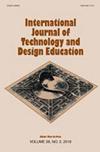探索在技术和设计教育中,学生对学生的谈话和提问的性质和作用
IF 2.7
3区 工程技术
Q2 EDUCATION & EDUCATIONAL RESEARCH
International Journal of Technology and Design Education
Pub Date : 2023-10-10
DOI:10.1007/s10798-023-09849-3
引用次数: 0
摘要
学生之间的课堂对话是复杂的,每天都有多种原因。学生对话也让教师洞察学生的学习。本文介绍了一项定性研究的结果,该研究使用社会文化理论的一个分支对话,深入调查了新西兰南岛农村小镇初中课堂上学生对学生(学生间)的技术问题学习。我们调查了学生间的对话,而0-4年级的学生则承担了一个技术单元,为即将到来的学校制作的班级项目设计和制作道具和服装。在这项研究中,通过记录和分析学生间的谈话、观察、工作样本分析和对学生及其老师的焦点小组访谈,深入了解了学生对技术和技术理解的发展方面。这也让我们了解到学生们对与同龄人交谈的价值的看法。本研究旨在对课堂对话、学生学习、形成性评估和技术教育等领域做出具体贡献。报告了三个主要发现,第一个与教师对课堂谈话的看法有关。他们都意识到课堂上谈话的价值,但由于一系列原因,很难实现深入的学生对话。第二项研究关注的是学生对谈话的看法。起初,学生们意识到他们用问题向老师、同学或父母寻求帮助,但研究数据显示,他们对对话有了更复杂的理解。第三个主要发现集中在学生在进行技术实践时提出的问题的性质上。研究结果表明,社会互动在发展参与者对技术的理解方面发挥了关键作用,他们通过提问来澄清、合作、支持和捍卫自己。本文章由计算机程序翻译,如有差异,请以英文原文为准。

Exploring the nature and role of student-to-student talk and questioning among young children in technology and design education
Abstract Classroom conversation between students is complex and used for multiple reasons every day. Student dialogue also allows teachers insight into student's learning. This article presents findings from a qualitative study that used dialogism, a branch of sociocultural theory, to investigate in depth student to student (inter-student) questioning learning in technology in junior primary classrooms in small town in rural South Island, New Zealand. Inter-student dialogue was investigated while students from Year 0–4 undertook a technology unit to design and make props and costumes for their class item in the up-coming school production. In this study insight was gained into aspects of development of student understanding in and of technology through the recording and analysis of inter-student talk, observation, analysis of work samples and focus group interviews with the students and their teachers. It also allowed insight into students’ views of the value of talking with their peers. This study aimed to contribute specifically to the fields of classroom dialogue, student learning, formative assessment and technology education. Three key findings are reported, the first related to teachers’ views of classroom talk. Both were aware of the value of talk in the classroom but struggled to implement in-depth student dialogue for a range of reasons. The second finding focused on students’ views on talk. Initially students recognised that they used questions to ask their teacher, peers, or parents for help, however after the study the data showed that a more sophisticated understanding of dialogue emerged. The third key findings focused on the nature of students’ questions while undertaking technology practice. Findings showed that social interaction played a key role in developing participants’ understanding of technology and that they used questioning to clarify, collaborate, support and defend themselves.
求助全文
通过发布文献求助,成功后即可免费获取论文全文。
去求助
来源期刊
CiteScore
5.30
自引率
19.00%
发文量
61
审稿时长
>12 weeks
期刊介绍:
The International Journal of Technology and Design Education seeks to encourage research and scholarly writing about any aspect of technology and design education. Critical, review, and comparative studies are particularly prominent, as are contributions which draw upon other literatures, such as those derived from historical, philosophical, sociological or psychological studies of technology or design, in order to address issues of concern to technology and design education.
One of the most significant developments of recent years has been the emergence of technology and design education as an integral part of general education in many parts of the world. Its distinctive curriculum features are technological literacy and capability and it highlights the importance of `knowledge in action'', of `doing'' as well as `understanding''.

 求助内容:
求助内容: 应助结果提醒方式:
应助结果提醒方式:


